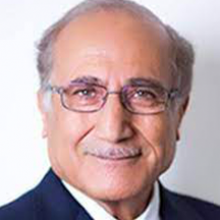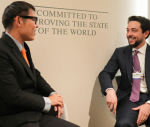You are here
Populism and marginalism
Feb 19,2018 - Last updated at Feb 19,2018
Prime Minister Hani Mulki kept the country busy and apprehensive over his health condition. Thank God it turned out that he has a curable form of cancer. We all wish him well, and are appreciating that he braved the matter with fortitude and good mood.
Yet, upon his return and intending to put off all the rumours about his government’s survival, his health and the correctness of his economic policies, he made an orchestrated television interview.
The tone was vintage, loud and angry. Yet, I do not think he did that on purpose. His body language was very interesting. Aware that TV cameras showed his profile, he kept tilting his head to show his portrait, especially when he wanted to emphasise his point. When he made predictions about the state of the economy, he wiggled his fingers and poked the air to assert his confidence in what he was saying.
It was not a good interview, except for one major redeeming factor. He reaffirmed the fact that his term as prime minister is not over. The rumours that he will perform a Cabinet reshuffle seem more probable now. The fact that a reshuffle is imminent indicates that Mulki’s government will be staying for some time to come. According to the prime minister’s TV interview, he is going to stay in the job until July 2019 at the earliest.
Dr. Mulki wanted to send a clear message: “I am not going to succumb to populist decisions in order to appease people, but to do what I think is right.” That is a statement
that must be stopped at.
Certainly, the Jordanian people would not want to have the prime minister make decisions for the sole purpose of appeasing them; they want him to make the right economic policy decisions. Heeding people’s appeals and sky-high complaints does not mean populism. These complaints signal the marginalisation the people are feeling.
There is no way that the government would be able to succeed in implementing an austerity programme without convincing the people of its benefits and viability. The prime minister appeared on television to appeal to the people to believe in his economic policies just because he tells them that these policies will bear fruit later on. It is a contradiction to appeal to people to believe in a programme that was already introduced, as if telling them that their approval was not important anyway.
The prime minister needs to work more on improving the government’s ability to communicate with the people. Some believe that the prime minister was sincere about all that he said, and that he had faith in his ability to deliver on what he promised.
He challenged the economists to prove him wrong. He challenged the sceptics that the data at the end of 2018 will prove him right. He promised that people would witness some easing of the economic crisis — getting out of the bottleneck — by mid 2019.
So far, all data is moving in the wrong direction. To fulfill his promises, the prime minister needs a paradigm shift, otherwise, the monetary red lines will be crossed.
It is not true that he is the only prime minister to prefer truth over populism. His predecessor Abdullah Ensour did not do that, but he was a better and more articulate communicator.













